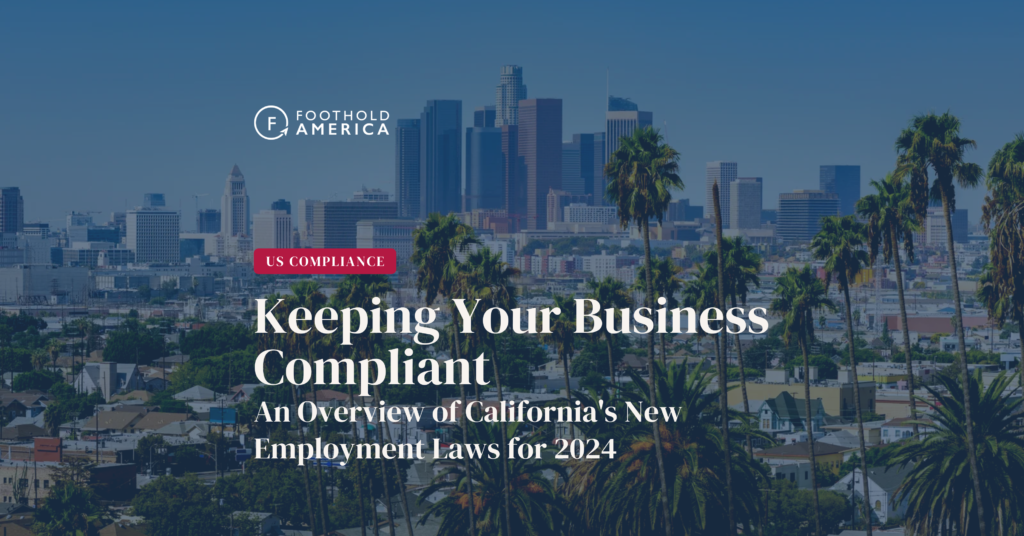DISCLAIMER: This guide is intended for informational purposes only and does not constitute legal advice. For specific legal guidance, please consult with an attorney licensed in your state.
California is ushering in a new wave of employment laws in 2024 that will have significant implications for both employers and employees. From expanded paid sick leave to noncompete agreements, workplace violence prevention, and off-duty cannabis use, these new laws reflect the ever-evolving landscape of employment regulations in the state. In this blog post, we will provide a comprehensive overview of the key changes and updates to California’s employment laws for the year 2024.
1. Expanded Paid Sick Leave (SB 616)
California’s existing paid sick leave law, the Healthy Workplaces, Healthy Families Act of 2014, is set for significant expansion with the introduction of Senate Bill (SB) 616. Under this new law, employees will now be entitled to five days or forty hours of paid sick leave, as opposed to the previous three days or twenty-four hours. Employers can choose to either accrue sick leave at the rate of one hour for every thirty hours worked (if they proceed with the route of the accrual, the sick leave plan must accrue up to 80 hours [10 days] of sick leave with a leave max of 40 hours [5 days]) or front load the entire amount. Annual usage caps and accrual caps have also been increased to provide employees with greater flexibility.
2. Noncompete Agreements and Notice Requirements (SB 699, AB 1076)
SB 699 prohibits employers from entering into or enforcing noncompete agreements with employees in California, irrespective of where the agreement was entered into or signed. Additionally, AB 1076 mandates that employers notify current and former employees, employed after January 1, 2022, that any noncompete agreements they have signed are void. These laws aim to protect employees’ freedom in seeking new employment opportunities.
3. Reproductive Loss Leave for Employees (SB 848)
SB 848 introduces a new provision allowing eligible employees to take up to five days of unpaid leave following a “reproductive loss event.” This includes failed adoptions, failed surrogacy, miscarriages, stillbirths, and unsuccessful assisted reproduction. Employees must be employed by an employer with at least five employees for at least thirty days prior to taking this leave.
4. Workplace Violence Prevention Program (SB 553)
Starting July 1, 2024, California will require employers to adopt comprehensive workplace violence prevention plans. These plans can be part of existing injury and illness prevention programs or separate documents. The new law imposes specific requirements such as recording incidents or threats in a violent incident log, providing training to all employees, and maintaining records related to the prevention plan.
5. Arbitration Enforcement (SB 365)
SB 365 amends California’s Code of Civil Procedure to state that the perfecting of an appeal does not automatically stay trial court proceedings during the appeal. This law will come into play when a court denies a petition to compel arbitration, allowing the litigation to continue during the appeal.
6. Off-Duty Cannabis Use and Drug Test Results (AB 2188, SB 700)
AB 2188 makes it unlawful for employers to discriminate against individuals based on off-duty cannabis use or the results of drug screenings that detect nonpsychoactive cannabis metabolites. While employees cannot possess or use marijuana on the job, employers cannot penalize them for lawful off-duty use. SB 700 expands on this by prohibiting employers from requesting information about an applicant’s prior use of cannabis.
7. Industry-Specific Laws
- Increased Minimum Wage for Health Care Workers (SB 525): This law enacts a mult-tiered statewide minimum wage schedule for health care workers employed by covered health care facilities
- Fast Food Minimum Wage Increase to $20/hour (AB 1228): AB 1228 replaces the FAST Food Accountability and Standards Recovery Act and establishes a $20 per hour minimum wage for fast food workers starting April 1, 2024.
- Food Handler Cards (SB 476): SB 476 requires employers to cover the costs associated with obtaining a food handler card for eligible workers.
Conclusion
As we enter 2024, California’s employment laws undergo significant changes that impact employers and employees alike. From the expansion of paid sick leave to restrictions on noncompete agreements, it is crucial for businesses to stay informed and adapt their practices to ensure compliance with the evolving legal landscape. At Foothold America, we understand the complexities of US employment law and regulations, and we are committed to staying on top of these new laws on behalf of our clients.
By partnering with Foothold America, you can have peace of mind knowing that we will navigate the intricacies of California’s (and all of the other) employment laws for you. Our team of experts will ensure that your business remains compliant at all times, so you can focus on what you do best – growing your business.

